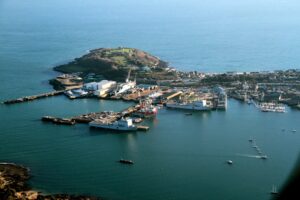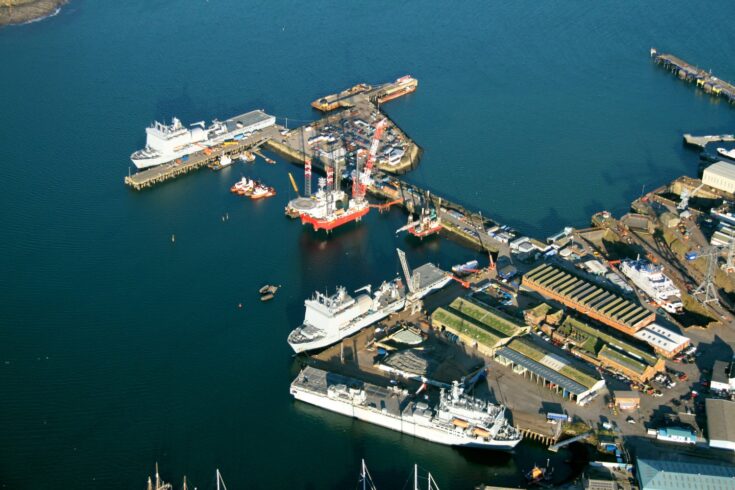Ship repair specialists A&P Falmouth spearhead a novel project to introduce shore power to a busy and innovation-focused international port.
Fuelling and energy use are significant issues for the maritime sector, with no currently available overarching solution to the complex needs of different stakeholders that offers true resilience for the future.
Investment and new ideas for clean energy programmes are therefore key to the revolution, in order to position the UK at the forefront of net zero maritime.
Falmouth, Atlantic & Peninsula clean shore power future
The Falmouth, Atlantic & Peninsula clean shore power future project is an industrial research project looking to significantly reduce the local and global impact of shipping emissions for a wide range of vessels while docked in Falmouth.
The project is established in a key location as one of the largest natural deepwater harbours in the world. It will support a flexible shore power opportunity for commercial vessels, energy providers and owners of renovated vessels who are all part of this busy working port.

The Falmouth docks. Credit: A&P Falmouth
The project scope
The project is led by the UK’s leading experts in ship conversion and repair, A&P Falmouth. They are working alongside sustainable technology design specialists Marine Zero and a consortium of vessel operators, councils and partnerships, as well as leading voices from the UK offshore wind sector.
It will focus on the design, installation and testing of a resilient, high-voltage supply system for critical infrastructure and users, the first of its kind in Cornwall.
The power system across the port will allow carbon zero connection to a variety of vessels at different locations around the A&P Falmouth site simultaneously. These include:
- a range of Ministry of Defence vessels during their refit and repair periods
- the developing floating offshore wind sector
- port users, such as an expanding cruise market and other commercial vessels who can all benefit from energy saving in different ways
The project will also complete a number of analysis tasks to assess the underlying strategy to the power system, along with its performance and opportunities to further continue its development as customer demand increases.
Aims and ambitions
The project’s initial aim is to create a fully functional system ready for use by vessels from March 2025 as the project enters its demonstration phase. Here, the ambition of providing clean power to ships will allow them to switch off their engines while idling in the port.
The project will also look to showcase the impact of noise and emissions reduction benefits that will result from the change in power and the reduced reliance on both on-board and shore-based generators. Identifying and reporting these benefits for port users and the nearby community will be a key part of the project’s aim to demonstrate the continued development taking place on site.
As the project develops, the partners will aim to identify and publicise various scalability opportunities. These include the ability to charge electric vehicles on site and the potential for future interaction with clean energy achieved from the nearby offshore wind industry, a big part of the net zero focus of the Falmouth port.
Looking at the environmental mission, Drystan Jones, Port Operations Director at the A&P Group, said:
We recognise that the maritime sector and wider industry contributes to Cornwall’s overall carbon emissions, so we need to act with ambition now to address the net zero gap. As well as the impact for Falmouth and Cornwall, the solutions developed by this project will allow deployment of similar solutions within the multiple locations of the A & P Group, as well as many other ports, harbours and dockyards around the UK and beyond. In a competitive landscape, keeping Falmouth and the UK maritime sector at the head of international port innovation is key.
About the funding
This project is part of the Zero Emission Vessels and Infrastructure (ZEVI) scheme, funded by UK government.
As part of ZEVI, the UK Department for Transport has allocated £80.4 million funding to 10 projects to build clean maritime vessel and infrastructure solutions by March 2025 and operate them until March 2028. The projects are supported by 52 organisations across the UK and will leverage over £40 million private investment.
The ZEVI scheme is part of the department’s UK Shipping Office for Reducing Emissions (UK SHORE) programme, a £206 million initiative focused on developing the technology necessary to decarbonise the UK domestic maritime sector. The ZEVI scheme is delivered by Innovate UK.

